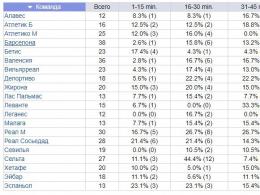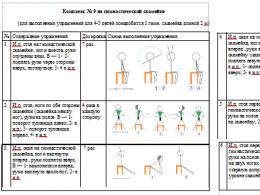How many grams of protein do you need per kg of weight. So how much protein should you eat per day?
At the beginning of a healthy lifestyle, a novice athlete is always bombarded with a huge amount of incomprehensible information. New information about how to eat, how to exercise, how much sleep ... and so on, and so on for each area. One of the first problems is the question of how much protein should be consumed per day if you are starting to do fitness and build muscle. We will answer this question easily and clearly!
First, how many calories do you need per day?
First, calculate your daily calorie intake. It's very easy to do this.
How much protein do you need per day?
Men's magazines and magazines for bodybuilders have made it a rule to give such an answer to the question of how much protein you need per day: for muscle growth, you need to consume 2 g of protein per 1 kg of body. This figure has settled down and has become a common place in the theory of bodybuilding and bodybuilding. Moreover, even more often there is information that for this figure it is necessary to increase as much as possible.
Institutions that are not associated with sports and muscle building have completely different information on this matter. The World Health Organization recommends that healthy modern adults consume 0.75 g of protein per 1 kg of body weight. And yes, we are talking about men, in women this dose fluctuates at the level of 0.5 g of protein per 1 kg of body weight. Rospotrebnadzor of Russia measures the norms differently: in our Russian climate, an adult man is recommended to consume from 60 g to 120 g of protein per day. Quite a spread, isn't it? The following information also appears: consuming more than the indicated amounts of protein is simply harmful: the kidneys will not cope and the liver will go haywire.
But there are not so many patients among bodybuilders who die from protein overkill, despite the fact that many consume 300-500 g per day (and you also add steroids that are unhealthy here). So, health problems with an overabundance of protein are a myth? And what should an ordinary person who wants to build a healthy and beautiful body do? How much does he need? And how can he even draw any conclusions when it is clear from the foregoing: the average person consumes too little protein per day, and bodybuilders - too much?
Safe protein intake
We read the theory about how much protein you need per day, and here's what we found out: there is no link between increased protein intake and heart disease (in fact, high protein intake reduces the risk of coronary heart disease). The only indisputable link between high fat intake and heart disease is fairly accurate and proven. With a protein intake of about 2 g per 1 kg of body weight, no diseases of the kidneys, liver, heart and bones were detected in the short term. People have also been observed using protein in the amount of 2.8 g per 1 kg of body weight - and what do you think? No kidney problems in the short term.
It has been proven that high protein intake does not have a negative effect on the kidneys.
There is another opinion: excessive protein intake leaches calcium from the body. Studies have shown that there is no difference between 50 g per day and 150 g in the field of calcium excretion. It can be taken as an axiom: the consumption of protein in the amount of plus or minus 2 g per 1 kg does not have any negative impact on health. And yes, men's magazines, in general, are right: to increase muscle, it is worth consuming exactly this amount! Moreover: if you consume more than 3 g per 1 kg of body (+40% of calories), you will not harm the body, and the muscles, accordingly, will grow larger and faster! You decide.
How much protein to eat in one meal?
According to research, muscle protein synthesis increases depending on the dose of protein supplied at a time. Muscle protein synthesis can be stimulated with a maximum of 3-4 g of the branched chain amino acid leucine, which is equal to 0.05 g per 1 kg of leucine. This means that to get 3-4 g of leucine you need 30-50 g of protein. Approximately this amount of protein you should consume in 1 meal.
How often should you eat protein?
This question, accordingly, fights with the question of how often you need to eat in general. The stimulation of protein synthesis can be repeated every 3-4 hours - so often you should eat.
If you focus on daily workouts, then you should consume protein like this:
- Before the start of strength training (30-40 minutes before)- 0.3-0.4 g per 1 kg
- During a workout- 10-12 g
- After workout- 0.3-0.5 g per 1 kg.
Learning to balance
We have already learned that a high protein intake will not cause you physical harm. But there is another extreme: with high use  protein intake of carbohydrates, logically, low. Low carbohydrate intake will still lower your performance: what's the point of increasing the amount of protein if the main source of energy is still not enough? It's not for us to tell you how life is on a low carbohydrate intake: bad mood and reduced immunity are just the tip of the iceberg. Plus, with a low carbohydrate intake, the body will not be able to quickly recover from a workout, which means that you will train less often and less intensively, and all efforts to increase the amount of protein will be pointless.
protein intake of carbohydrates, logically, low. Low carbohydrate intake will still lower your performance: what's the point of increasing the amount of protein if the main source of energy is still not enough? It's not for us to tell you how life is on a low carbohydrate intake: bad mood and reduced immunity are just the tip of the iceberg. Plus, with a low carbohydrate intake, the body will not be able to quickly recover from a workout, which means that you will train less often and less intensively, and all efforts to increase the amount of protein will be pointless.
Oddly enough, carbohydrates have no less and almost more influence on muscle growth than proteins. Moreover, fats cannot be excluded from the diet - none of the macronutrients can be excluded, all of them are of great importance for the human body and especially the body of an athlete carrying overload.
***
If you use protein not from chemistry and cocktails, but more from foods high in leucine - eggs, milk, some types of meat, then less percentage of the substance is required for successful muscle growth. Simply put, the higher the quality, the less you need. Keep this in mind as you build your new champion diet!
Master of all site and fitness trainer | more >>
Genus. 1984 Trained since 1999. Trained since 2007. CCM in powerlifting. Champion of Russia and the South of Russia according to AWPC. Champion of the Krasnodar Territory according to IPF. 1st category in weightlifting. 2-time winner of the championship of the Krasnodar Territory in t / a. Author of over 700 articles on fitness and amateur athleticism. Author and co-author of 5 books.
Place in : out of competition ()
The date: 2015-10-31 Views: 27 468 Grade: 4.8

I must say right away that by protein in this article I mean protein in general (as a whole), and not just protein, like a sports supplement, or not just protein that is in regular food.
So, everyone answers this question differently: 1 gram per 1 kg of body weight, 2 grams, 3 grams and even 4 grams! A bunch of studies have been done, and they all also showed different results. But the difference of 1 and 4 grams is a fucking difference! In this article, I will not provide any research. All figures are purely my coaching experience, which I have accumulated over 9 years of observation and training of my wards.
I also want to say at the beginning that many of these experiments were sponsored by sports nutrition manufacturers. And it is beneficial for them to get more protein. After all, this will encourage you to buy more protein. Are you savvy? Well, now to the point.
Weight loss and mass gain
My experience tells me that for and for you need to consume the same amount of protein. In the first case, we need protein to save muscles from decay, and in the second, to increase muscle volume.
But the smart reader will ask: right, you need less protein to maintain muscle than to grow it? Yes it is. But we must not forget that when burning fat, you need to cut the amount of carbohydrates and fats. And then what is left to collect? That's right, just proteins. Yes, and fat burning workouts are much more intense. This means that the process of muscle destruction will also proceed more intensively. So it turns out that that's what it comes out to.
Men and women
Women need less protein per 1 kg of body weight than men. First, they have less testosterone. And this means that the process of muscle recruitment is much slower than in men. And they have less muscle mass in relation to body weight. On average, athletically built men have % of muscles - 50% -55% of body weight. And for women - 40% -45%. Less muscle means less protein needed.
All this leads to the fact that women (ceteris paribus) need about 25% - 30% less protein than men. Many authors, when they talk about the amount of protein, for some reason do not separate men and women.
And now the numbers!
For fat burning or mass gain you need:
- Men 1.5 - 2 grams of protein per 1 kg of body weight.
- Women 1.5 g of protein per 1 kg of body weight.
To keep in shape:
- Men 1 - 1.5 grams of protein per 1 kg of body weight.
- For women, 1 gram of protein per 1 kg of body weight.
As you can see, no 3-4 grams, as some gurus say and some experiments show. Let me remind you once again that all these grams are the amount of protein in general: regular food + protein (if you take it).
You can also say that for teenagers and people under 18 - 19 years old, you need to adhere to the upper limits of the norm. Guys 2 gr, and girls 1.5 gr. Since in addition there is an increase in the body as a whole.
How much protein can be digested at a time?
It is widely believed that only 30 grams can be digested at a time. Complete nonsense. There is no counter in the body that counts these 30 grams. Remember, the body will absorb exactly as much protein at a time as it needs this protein at that very moment. It can be 20, 30, 40 and even 100 grams. Of course, you can never know how much protein your body needs right now. Therefore, simply divide your daily protein requirement into 4-5 meals per day. So the risk of missing and drinking excess protein is minimized. Let's say if you weigh 100 kg and take 200 grams of protein per day, then divide this 200 by 4-5. And it will turn out 40 - 50 grams at a time.
In general, I suspect that information about 30 grams at a time was deliberately distributed by sports nutrition manufacturers so that you drink protein more often. It's a conspiracy theory! We are being watched!)) Well, or so they decided on the basis of 1 - 2 experiments, in which there were large errors or a highly specialized selection of people.
And in what cases can you need more than 2 grams?
If you are not a professional bodybuilder, then there is absolutely no reason for you to take more than 2 grams per 1 kg of weight. If you're on 2 grams and you're still not gaining muscle mass, then it's not about protein. As my experience shows, meat grows well in most cases and at 1.5 g (for men) per 1 kg of weight. Well, 2 grams is an ideal and more than sufficient condition. Therefore, my personal opinion is that taking more than 2 grams of protein will not give you a greater effect.
conclusions
1. As you can see, it is not at all necessary to consume such a large amount of protein as the fitness industry is trying to impose on us. For an ordinary citizen, a maximum of 2 grams is enough, and for a citizen - 1.5 grams per day per 1 kg of body weight.
2. In the case of professional bodybuilders who take up to 4 grams, one should not forget that their muscle mass is 70% - 75% of body weight. And the use of pharmacology greatly accelerates the metabolism, so that protein breakdown occurs at a much higher rate.
3. Well, remember that all the numbers that I gave in this article are the result of my personal long-term observations. Which, in part, were in many ways similar to mini-experiments. I can, of course, be wrong, but for me, practical experience is much more important than experimental data. After all, what is this data worth if in practice everything is different? Good luck!
Expert opinion
Slepchenko Dmitry- Coach, CCM in powerlifting, CCM in kettlebell lifting
Very informative article, clear, concise and all in its own way. Protein does play a very important role in both weight gain and weight loss. Only the difference is in the percentage of BJU of the entire diet. If you go into details, then the body spends more energy on the absorption of protein than it receives. This is where the extra calories come from.
Therefore, when losing weight, the amount of protein should be increased. But this is not about a cardinal increase, but only by 0.5-1 grams per 1 kg of weight, and the amount of carbohydrates should be reduced. And when gaining weight, nevertheless, the most important role is played by carbohydrates and they should be in excess, but while maintaining the protein norm.
As you know, daily protein intake is necessary for maintaining health and proper functioning of the body. And if you want to lose weight, build muscle, improve your appearance or body capabilities, protein (and its amount) becomes even more important.
Now that you know why you need it, the question is "how much?". More specifically, how much protein your body needs to achieve a specific goal.
So let's answer the question...
How much protein should a person eat per day?
For most ideal daily protein intake is: 1.6-3.0 g per kg of body weight.
Of course, this range is quite wide. Here are guidelines on how to narrow it down to what you need.
Recommended amount of protein per day based on starting fitness and goals
| Man, his physical form and goals | Ideal Daily Protein Intake |
| man or woman), who leads a predominantly sedentary lifestyle and almost does not play sports. This is the minimum daily amount of protein to maintain the overall health/function of the body. |
1,0-1,4 grams of protein per kg of body weight. |
| The average healthy adult ( man or woman) who regularly performs non-intense physical exercise or tries to improve his body (lose excess weight, build muscle, etc.). This is the minimum recommended amount. |
1,6-2,0 grams of protein per kg of body weight. |
| Average healthy adult woman |
2,0-2,4 grams of protein per kg of body weight. |
| Average healthy adult the male , whose main goal is to build muscle mass, make muscles more prominent and “dry”, increase endurance or performance. |
2,0-3,0 grams of protein per kg of body weight. |
If you're still in doubt, the "2g protein per kg bodyweight" recommendation that has reigned in the fitness world for decades is an average protein intake that's good enough for most people.
So, in order to find out how much protein you need every day, you should multiply your current body weight (in kilograms) by the amount of protein recommended in the table above.
Here are 2 examples:
- A woman weighing 65 kg who wants to build muscle, make them more prominent or get rid of excess fat (while maintaining muscle mass), should multiply 65 by 2.0-2.4. Daily protein intake in her case will be about 130-156 g per day.
- A 90 kg man who wants to increase muscle volume, maintain muscle during weight loss, or improve endurance/performance should multiply 90 by 2.0-3.0. Daily protein intake in his case will be about 180-270 g per day.
To put it even simpler, multiply your current body weight in kilograms by the generally accepted figure. As a result, you will get a range of the amount of protein that you need to consume per day.
Have you counted? Awesome! We have now figured out your daily protein requirement.
*Note*
For overweight people, the ideal amount of protein, when calculated using current body weight, will be inflated due to excess fat. Therefore, for those who are obese, a target body weight should be used. For example, a person weighing 150 kg, wishing to lose weight to 100, should use a weight of 100 kg in calculating the daily requirement.
As long as you stay within this "ideal" range, your protein intake will fully meet your needs and you'll get the best possible results as a result.
The next thing you need to know is a list of foods that should be present in your daily diet.
Examples of High Protein Foods

The following is a short, basic list of the most common high protein foods:
- Chicken (without skin);
- Turkey meat (without skin);
- Fish (all types);
- Beef (lean);
- Pork (lean);
- Whole eggs;
- Egg white;
- Protein supplements (whey protein powder, casein powder, protein bars, etc.);
- Legumes (all kinds);
- Nuts (all types);
- Milk;
This is not a complete list of foods that contain protein, but any of them will cover most of your needs. Just choose the ones you like the most.
How Protein Affects Total Daily Calories
Now that you know how much protein you need and what foods you can get it from, the last step remains. You need to calculate how many calories per day you get from protein. Don't worry, it's simple.
The only thing to know: 1 g of protein contains 4 calories.
Now you need to multiply the grams of daily amount of protein calculated earlier by 4 to find out exactly how many calories you will receive. Here are some examples:
- Take the 65 kg woman from the previous example. She consumes 130 g of protein per day. We get 130 x 4 = 520. In this example, 520 calories of total daily intake will come from protein.
- Now a 90 kg man. He consumes 220 grams of protein per day. We get 220 x 4 = 880. In this example, 880 calories of total daily calories will come from protein.
Now it's your turn. Multiply the ideal amount of protein that you calculated a minute ago by 4. That's how many calories you will have in your daily diet for protein.
This step may seem pointless or confusing, but don't worry. This will help you with other calculations to come up with the perfect meal plan.
According to materials:
http://www.acaloriecounter.com/diet/how-much-protein-per-day/
A large number of people do notmeet their daily protein intake. The main reasons why this happens: laziness and ignorance. But if a person starts to play sports, then he just needs to understand such a question as: How much protein do you need per day?

This is a must to knowMu that protein means a lot to our body. First of all, it is the most important material for the growth of muscle mass. In addition, a lot of different functions are associated with proteins: metabolism, immune system, protective functions, etc.
How much protein should you eat per day?
You have probably already heardand that a person needs to consume 2g of protein per 1kg of body weight. And professional athletes need to increase the amount of protein intake to 3 - 5g * 1kg of body weight. Various sports magazines write about this so often that people began to unconditionally believe in it. But, for example, modern medicine believes that the rate of protein intake should be: 65 - 130g per day. So who do you believe?
In fact, the daily requirement for protein for each person is individual. It depends on many factors: activity level, gender, age, etc. For someone, 65g of protein per day may be enough, and for someone, even 130g will not be enough.
How to calculate the daily protein intake per day?
For men:
For normal functionionization of the male body is enough 1g of protein * 1kg of body weight. 1g of protein - this is provided if you do nothing for days (that is, this is the norm of protein to maintain the vital functions of the body). If you are engaged in physical or mental labor, then the amount of protein increases to approximately 1.3 - 1.5g * 1kg of body weight.
Also, if you still lead a healthy lifestyle to all this and do at least some mini workouts to maintain a good physique, then the need for proteins will increase even higher, up to 1.6 - 1.8 g per 1 kg of body weight. Now imagine that you are an athlete (eg: bodybuilder), now your need for proteins will be much higher than in the average person. You need protein to both maintain vital bodily functions and build muscle. Now, your norm in protein is: 2 - 2.4g * 1kg of body weight.
For women:
For normal functioning0.7 - 0.8 g of protein * 1 kg of body weight is sufficient for the formation of the female body. 0.7g of protein is to maintain the vital functions of the body. If you are engaged in physical or mental labor, then the amount of protein rises to 1 - 1.3g * 1kg of body weight. For pregnant women, the amount of protein should be increased to about 1.5g * 1kg of body weight, and for nursing mothers, to 1.8g * 1kg of body weight. Also, if a girl goes in for sports, then to maintain an athletic physique, she will need 1.5 - 1.6g of protein * 1kg of body weight.
All these figures are average static values, this is, as it were, the point from which you need to start. Just learn to listen to your body, and it will tell you how much protein you need to eat per day.
Sincerely,

Ah, PROTEIN is the "magic" word. One of those very bricks of success, removing which, it will be almost impossible to achieve results in sports. In most sports, lean muscle mass plays a significant role. In bodybuilding, for example, this is the goal itself, and in sports that develop mainly endurance (swimming, running) - this is a means to achieve the goal. Therefore, overall muscle mass, strength, and endurance can benefit athletes in many ways, depending on their sport, capabilities, and needs. Therefore, it is very important to determine how much protein you need to consume per day in order to support these "needs".
There is a lot of controversy around protein intake, and more often than not, the two most competing sides of the debate are meeting the minimum dietary requirements versus the maximum amount of protein that will lead to optimal performance and muscle growth. The issue of safety is also a concern, as it is claimed that excessive protein intake can be detrimental to bones, kidneys, liver, and can lead to dehydration.
These lingering concerns about the harmful effects of high protein intake may be one reason why most recommendations tend to be overly conservative, despite a number of studies stating to the contrary that high protein intakes can be beneficial for performance and lean muscle building. .
To change this paradigm, it is important not only to highlight how much protein is needed per day for optimal athletic performance and muscle growth, but also to note that there is little evidence to support the adverse health effects of high-protein diets.
High Protein Diet Safety Studies
If you happen to have a traditional, classically trained nutritionist at your side, but one who doesn't specialize in sports nutrition, you'll probably be surprised how different his recommendations for daily protein intake will be compared to what most fashionable sports magazines or bodybuilders would advise you. Plus, you will be shocked by the risks associated with high protein intake, which these highly specialized nutritionists will inform you about. So who is right? Bodybuilding gurus and champions or classically educated clinical nutritionist? The truth, as always, lies somewhere in the middle. More often than not, the average person consumes insufficient protein, while the bodybuilder abuses this nutrient.
But before making any definitive statements about how much protein to consume per day, safety needs to be examined.
Safety first

Do high-protein diets really carry health risks? In a review of 41 studies examining the alleged harmful effects of excess protein on athletes, it was noted that a protein intake of 2.8 grams per kg of body weight per day does not impair kidney function in the short term. And other studies that focus primarily on kidney function and the effects of protein on them have found that athletes who regularly consume more than 2 grams of protein per kg of body weight per day have not been found to have any impairment of kidney, liver or bone function. Another study looking at protein safety concerns for athletes noted that there is no association between high protein intake and heart disease (only between excessive fat intake and heart disease). In fact, a high protein intake per day (assuming fat is kept under control) has been found to reduce the risk of ischemic heart attack.
It was also concluded that there could be no link between high protein intake and poor kidney health. In addition, at least one study has shown improvement in kidney function in athletes who eat a high-protein diet.
Other studies have shown that 150 grams of protein has the same effect on calcium balance as 50 grams, contrary to the belief that high protein intake leads to calcium leaching. Finally, it was noted that bodybuilders who typically consumed more (about 50%) more protein than other athletes did not experience an increase in calcium excretion. Later, similar studies were carried out, which came to the same conclusions. Thus, it is safe to say that a protein intake in the region of 2g/kg per day does not carry a perceived health risk, at least for athletes and bodybuilders.
How much protein should you consume per day
Here it is, the most interesting part that could fit in one sentence. How much protein do you need per day? But you still need to know what, how, and why! So, what facts does the scientific world give on this issue? One study found that a protein intake of 2.1g/kg resulted in superior muscle mass gains than 1.2g/kg. In addition, generally accepted recommendations for protein intake for athletes (max 2 g/kg) are not always sufficient to maintain nitrogen balance. Therefore, a protein intake slightly above the recommendations is much more effective. In addition, the value of 2 g/kg is extremely unstable for maintaining muscle mass. Last but not least, consuming more than 3.0g protein/kg (or more than 40% of calories) poses no significant health risk.
How much protein do you need per day at one meal and how often
Another important point reached in some more recent studies is that muscle protein synthesis (MPS) increases depending on the dose of protein ingested. Since maximum muscle growth comes from an increase in MRP, the best option would be to focus not only on the total daily amount of protein consumed, but also on the amount in each meal, as well as frequency. The most recent studies have shown that MSP is maximally stimulated by 3-4g of the branched-chain amino acid leucine (or 0.05g/kg leucine), and that this stimulation can only occur every 3-4 hours.
Depending on the protein source, you usually need 30 to 50 grams of protein to get 3-4 grams of leucine.. Based on the frequency of MSP stimulation, it appears that the optimal protein intake for muscle growth is close to 2.5-3.0 g/kg. So, a 100 kg athlete will extract a maximum of 250-300 grams of protein daily, consuming it every 3-4 hours.
It all comes down to balance
Although high doses of protein may be completely harmless and bring many benefits, it would be unwise not to pay attention to a number of facts. First of all, it is the lack of carbohydrates, which leads to a decrease in performance. There is no point in consuming large amounts of protein when the lack of the main source of energy suffers from the effectiveness of training, and therefore the incentive to grow. In fact, if your carbohydrate levels are too low, no matter how much protein you consume per day, you risk losing muscle tissue.
Compared to protein, carbohydrates are just as important (if not more) for muscle growth. So yes it is possible athletes should consume more protein, but they should not forget about carbohydrates. And all of the above applies to fats. You cannot completely eliminate any macronutrient from your diet, as the presence of each of them leads to successful muscle growth.
Conclusion
It is known that if you eat protein sources that contain a lot of leucine (dairy products, eggs and various types of meat), then much less daily protein is required to stimulate PMS. That is, you need less protein if it is of high quality. And this will allow the athlete to leave more space in their diet for other important nutrients.






